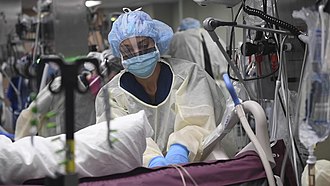Remote patient monitoring

Remote patient monitoring (RPM) is a type of telehealth that allows healthcare providers to monitor patients outside of conventional clinical settings, such as in the home or in a remote area, thereby increasing access to care and decreasing healthcare delivery costs. RPM uses various technological devices to collect medical and other forms of health data from individuals and electronically transmit this information securely to healthcare providers in a different location for assessment and recommendations.
Overview[edit]
Remote patient monitoring involves the use of digital technologies to collect health data from patients in one location and electronically transmit that information securely to healthcare providers in a different location for assessment and recommendations. This type of monitoring can include a wide range of physiological data, such as blood pressure, heart rate, weight, blood glucose levels, and oxygen saturation.
Technologies Used[edit]
RPM employs various technologies to collect and transmit patient data. These technologies include:
- Wearable devices: Devices such as smartwatches and fitness trackers that monitor and record health metrics.
- Mobile health apps: Applications on smartphones and tablets that can track health data and communicate with healthcare providers.
- Medical devices: Specialized devices like blood pressure monitors, glucometers, and pulse oximeters that are designed for home use.
Benefits[edit]
The benefits of remote patient monitoring include:
- Improved access to healthcare for patients in remote or underserved areas.
- Enhanced ability for healthcare providers to monitor chronic conditions and intervene early if necessary.
- Reduction in the need for hospital visits and admissions, thereby lowering healthcare costs.
- Increased patient engagement and self-management of their health.
Challenges[edit]
Despite its benefits, RPM faces several challenges:
- Data security and privacy concerns, as sensitive health information is transmitted electronically.
- The need for reliable internet connectivity, which may not be available in all areas.
- Potential resistance from patients and healthcare providers to adopt new technologies.
- Regulatory and reimbursement issues that can vary by region and healthcare system.
Applications[edit]
Remote patient monitoring is used in various medical fields, including:
- Cardiology: Monitoring heart conditions and managing patients with heart failure.
- Endocrinology: Managing patients with diabetes through continuous glucose monitoring.
- Pulmonology: Monitoring patients with chronic obstructive pulmonary disease (COPD) and other respiratory conditions.
- Geriatrics: Assisting elderly patients in managing multiple chronic conditions and maintaining independence.
Future Directions[edit]
The future of remote patient monitoring is likely to see advancements in technology, such as the integration of artificial intelligence and machine learning to provide more accurate and predictive health insights. Additionally, the expansion of 5G networks will enhance the capability and reliability of RPM systems.
See Also[edit]
References[edit]
<references group="" responsive="1"></references>
External Links[edit]
| Telemedicine | ||||||||||
|---|---|---|---|---|---|---|---|---|---|---|
This telemedicine-related article is a stub.
|
Ad. Transform your life with W8MD's Budget GLP-1 injections from $75


W8MD offers a medical weight loss program to lose weight in Philadelphia. Our physician-supervised medical weight loss provides:
- Weight loss injections in NYC (generic and brand names):
- Zepbound / Mounjaro, Wegovy / Ozempic, Saxenda
- Most insurances accepted or discounted self-pay rates. We will obtain insurance prior authorizations if needed.
- Generic GLP1 weight loss injections from $75 for the starting dose.
- Also offer prescription weight loss medications including Phentermine, Qsymia, Diethylpropion, Contrave etc.
NYC weight loss doctor appointmentsNYC weight loss doctor appointments
Start your NYC weight loss journey today at our NYC medical weight loss and Philadelphia medical weight loss clinics.
- Call 718-946-5500 to lose weight in NYC or for medical weight loss in Philadelphia 215-676-2334.
- Tags:NYC medical weight loss, Philadelphia lose weight Zepbound NYC, Budget GLP1 weight loss injections, Wegovy Philadelphia, Wegovy NYC, Philadelphia medical weight loss, Brookly weight loss and Wegovy NYC
|
WikiMD's Wellness Encyclopedia |
| Let Food Be Thy Medicine Medicine Thy Food - Hippocrates |
Medical Disclaimer: WikiMD is not a substitute for professional medical advice. The information on WikiMD is provided as an information resource only, may be incorrect, outdated or misleading, and is not to be used or relied on for any diagnostic or treatment purposes. Please consult your health care provider before making any healthcare decisions or for guidance about a specific medical condition. WikiMD expressly disclaims responsibility, and shall have no liability, for any damages, loss, injury, or liability whatsoever suffered as a result of your reliance on the information contained in this site. By visiting this site you agree to the foregoing terms and conditions, which may from time to time be changed or supplemented by WikiMD. If you do not agree to the foregoing terms and conditions, you should not enter or use this site. See full disclaimer.
Credits:Most images are courtesy of Wikimedia commons, and templates, categories Wikipedia, licensed under CC BY SA or similar.
Translate this page: - East Asian
中文,
日本,
한국어,
South Asian
हिन्दी,
தமிழ்,
తెలుగు,
Urdu,
ಕನ್ನಡ,
Southeast Asian
Indonesian,
Vietnamese,
Thai,
မြန်မာဘာသာ,
বাংলা
European
español,
Deutsch,
français,
Greek,
português do Brasil,
polski,
română,
русский,
Nederlands,
norsk,
svenska,
suomi,
Italian
Middle Eastern & African
عربى,
Turkish,
Persian,
Hebrew,
Afrikaans,
isiZulu,
Kiswahili,
Other
Bulgarian,
Hungarian,
Czech,
Swedish,
മലയാളം,
मराठी,
ਪੰਜਾਬੀ,
ગુજરાતી,
Portuguese,
Ukrainian
